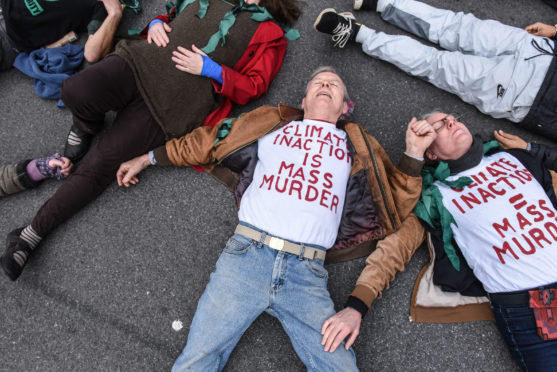I was having a chat with my grandson Jacob about Dippy the Diplodocus after he travelled from Aberdeen to Glasgow to see one of the world’s most famous dinosaurs.
The giant cast is on tour and was a wondrous sight for a seven-year-old as it towered inside Kelvingrove museum.
I think it was one of those “friendlier” dinosaurs in Jurassic Park. You know, the smiley kind with ridiculously long necks which enabled them to munch through leaves in trees, as opposed to their cousins who munched humans on the ground.
We spoke about how dinosaurs became extinct or were forced to evolve into new species as a climatic catastrophe befell the Earth.
As he excitedly recounted the drama of an asteroid smashing to Earth and blotting out the sun, which in turn killed most things off, I wondered about what kind of world we were leaving for our seven-year-olds.
How different might life be in 12 years’ time when Jacob is almost 20?
Current expert opinion tells us we have 12 years to put the brakes (literally for diesels and petrol vehicles) on the current rate of climate change or rising temperatures will bring global catastrophe. The challenge is to stop thermometers rising by more than 1.5C globally.
We watch Hollywood disaster films, but something always turns up in the end to save everyone.
Dates for the end of the world come and go, but even astrologer Nostradamus must get it right one day. An important UN committee once warned it would all be over by the year 2000.
Some say, “of course the sea is eroding our coastlines – that’s its job, after all.” It is why we have such striking and impressive coastal scenery. But what we have to ask is if this is now happening at an unprecedented rate?
The problem with human nature is that we wait until a crisis is smashing down our front doors before reacting to it. When it’s virtually too late.
Rock band Muse have an album track called “Apocalypse, Please”. It is about religious fanatics and self-fulfilling prophesies.
There were fanatics about over the past week warning of our impending doom, but they don’t want it to happen at all costs. Hundreds have been arrested for taking the law into their own hands in London.
It is easy to ridicule the huge carbon footprint which they created with their protests through mass disruption and longer journeys.
But maybe we need them to make us stop and think even though our busy daily lives always get in the way. For us, forgetting to fill our petrol tanks or book a holiday flight is like the end of the world. We need a sense of perspective and reflection over where we are heading.
We often wonder what can we do as individuals when some countries do not embrace the concept of putting their own houses in order. We are mere infinitesimal flecks of dust in this global storm.
I was eating a cheese-salad sandwich the other day while watching a news programme. I love cheese. If it wasn’t for my wife putting her foot down I’d have cheesy garlic bread with every meal.
A spokeswoman for the Extinction Rebellion campaign was put on the spot when asked what she was doing personally to save the world. She hesitated, and the first thing she thought of was, “I am eating less cheese”.
My heart sank mid-bite.
I started investigating and discovered that the cheese-production industry featured on a table of food carbon footprints, and could be expressed in the amount of comparative environmental damage done by a car journey.
I had half a kilo of cheese in my fridge, which is about 10 steps from my sofa. But campaigners claim half a kilo takes the equivalent of a 15-mile fuel-burning car journey to produce.
Can we trust our politicians as custodians of the planet? Hardly – none of the parties across the UK can be trusted to sort out Brexit, let alone save the world.
For every person who praised the street rebels, there was another who was simply annoyed by the disruption.
We can’t help thinking, why should we make the sacrifice when others don’t?
Could I ever give up cheese? Could you?
David Knight is the long-serving former deputy editor of the Press and Journal

